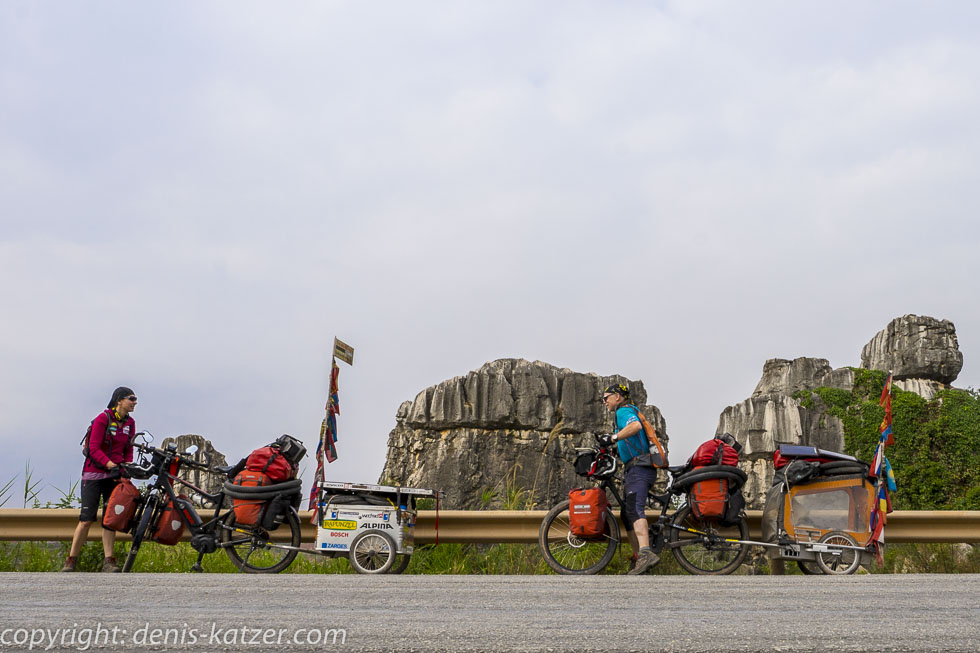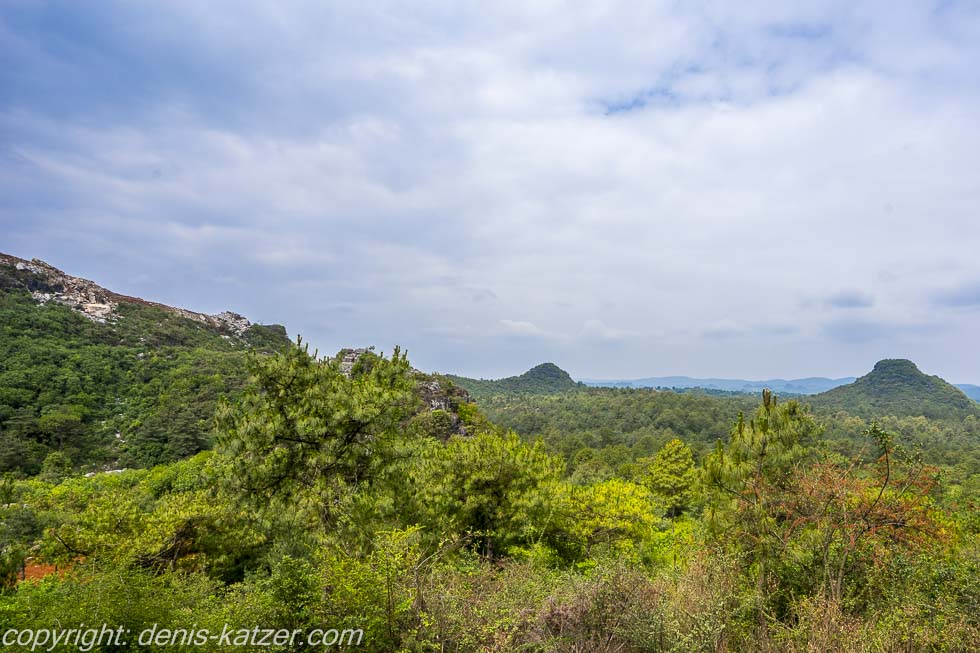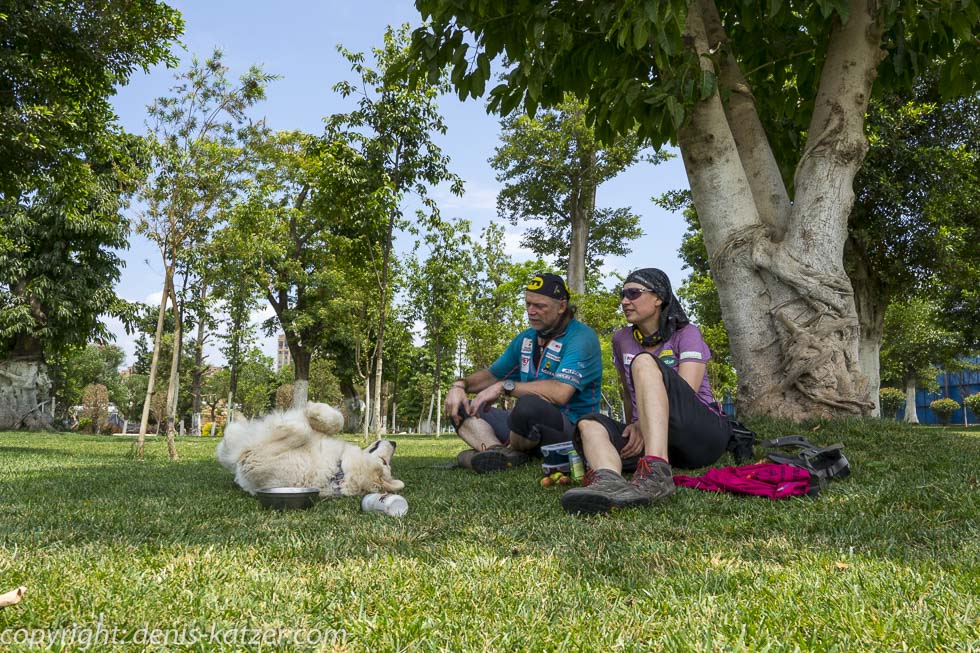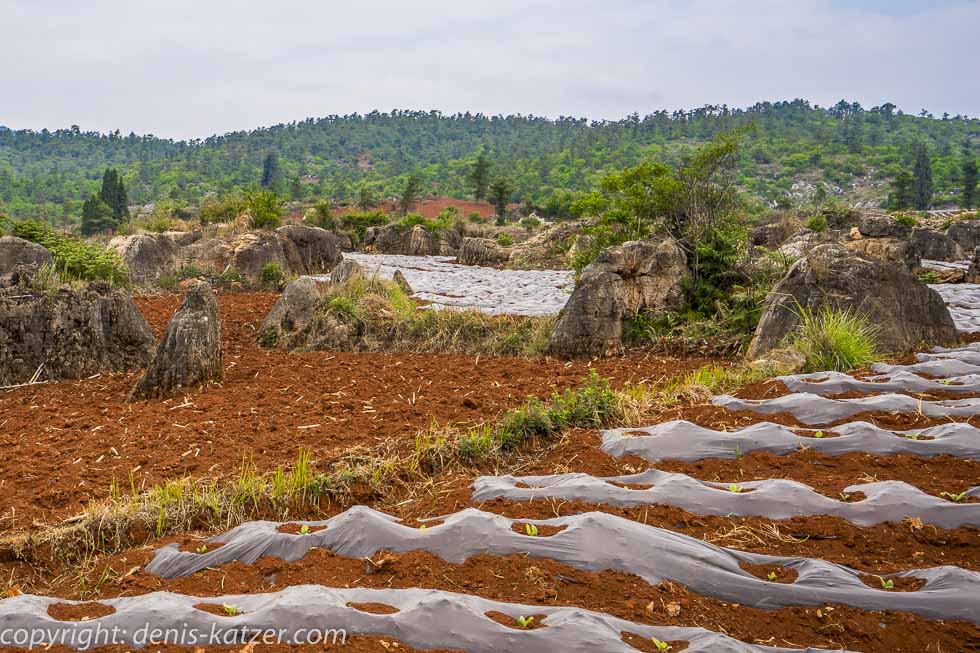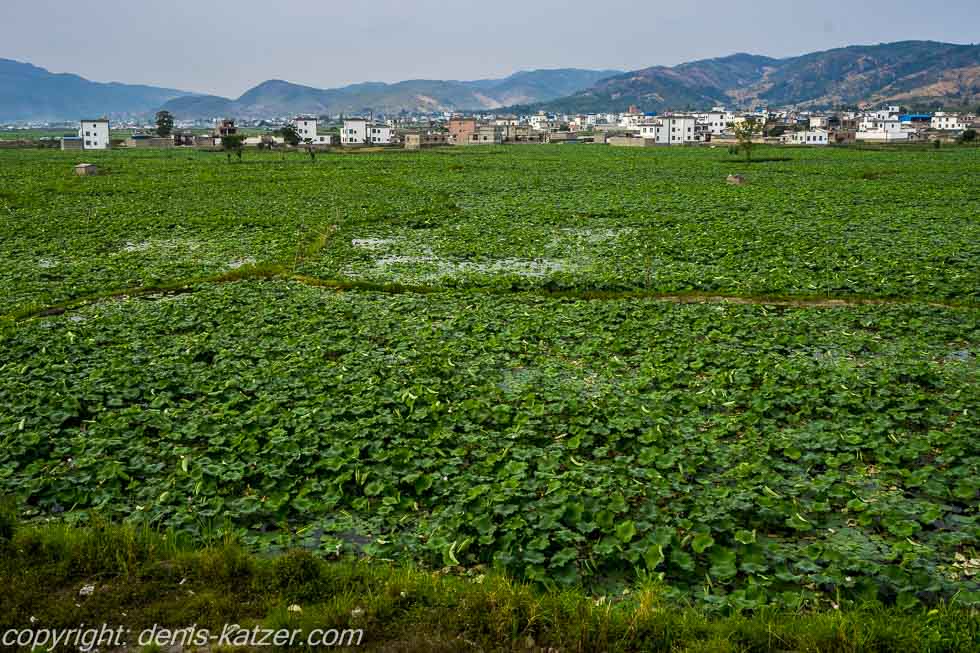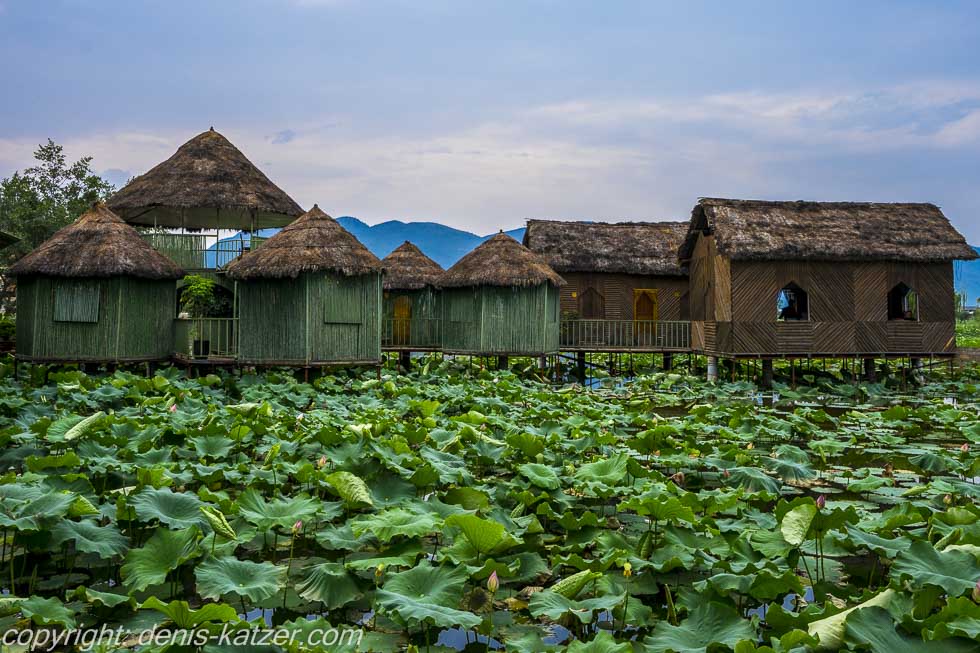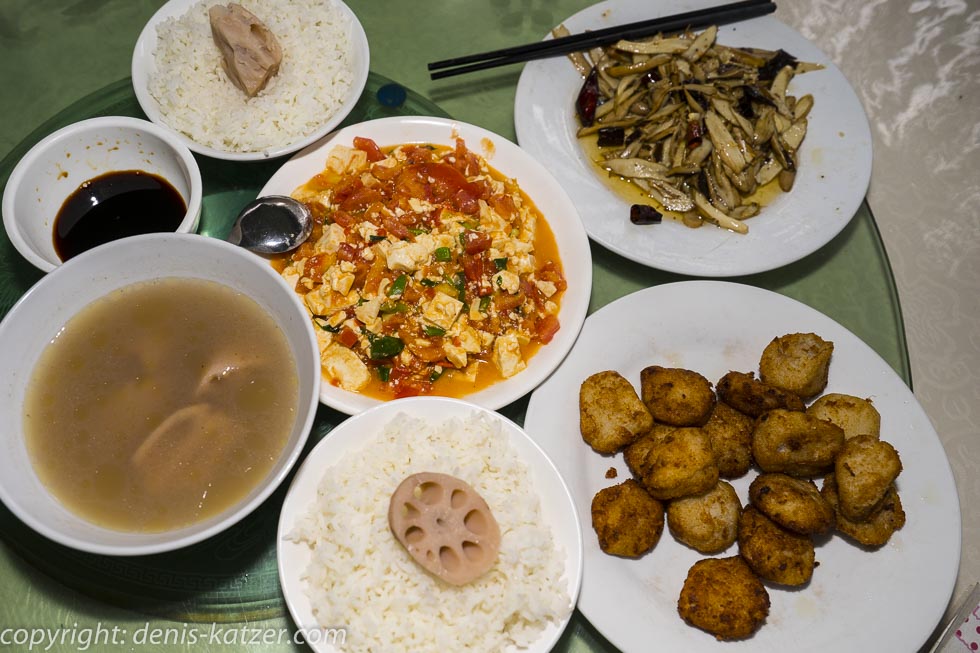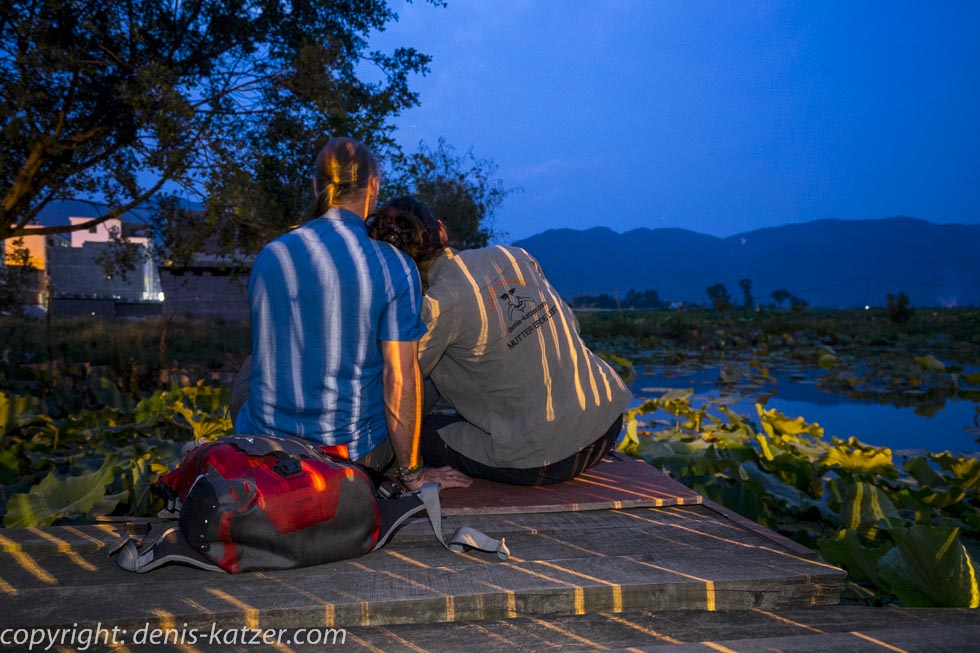
Lotus plants and mosquitoes
N 24°06'50.2'' E 103°24'44.3''
Date:
20.05.2016
Day: 328
Country:
China
Province:
Yunnan
Location:
Mile Shi
Latitude N:
24°06’50.2”
Longitude E:
103°24’44.3”
Daily kilometers:
85 km
Total kilometers:
17,066 km
As the crow flies:
74.05 km
Average speed:
21.7 km/h
Maximum speed:
53.4 km/h
Travel time:
03:53 hrs.
Soil condition:
Asphalt / Gravel
Maximum height:
2.000
Total altitude meters:
39.704 m
Altitude meters for the day:
689 m
Sunrise:
06:21 am
Sunset:
7:44 pm
Temperature day max:
25°C
Temperature day min:
17°C
Departure:
08:40 a.m.
Arrival time:
3:00 p.m.
(Photos of the diary entry can be found at the end of the text).
The karst mountains with their unique rock formations from prehistoric times are still with us today for quite some time. Then the landscape changes. Pine forests stretch over 2,000-meter-high, stumpy mountain cones. In the wide valleys, but also on the mountain slopes, or between rough boulders, every square meter is used for field cultivation. The earth looks dry, which is why we can’t imagine that anything could ever grow and flourish here. Above all, I wonder how the farmers in this mountain region are going to water the tender little plants? (At this hour we don’t yet know that the monsoon season has begun and is literally flooding the south of China and Vietnam ahead of us with torrential rain).
Around midday we reach another simple accommodation whose owners don’t want to let our bikes into the house. I study the map. “Either we find a place for our tent, or a place to stay in the village 20 km away,” I say, whereupon we drive on. We stop briefly under the shady roof of a petrol station and ask if there is coffee here. “Bu”, (No) replies the owner and hands us 12 bottles of water. “Sorry, I don’t need any water,” I refuse. “It’s a gift.” “Tuijianshu?” (Gift)?” I ask, puzzled. “Shi”, (yes) he says with a friendly laugh. “Where should we put them?” I ask Tanja. “There’s still room in your front panniers,” she replies. “So as not to have to refuse the generous gift, I put four ½ liter bottles in each of the front pockets. We drink two and return two. The friendly Chinese man wishes us a nice day. We thank him again and continue our journey, constantly on the lookout for a place to camp. However, vegetables are grown everywhere or there is dense undergrowth. The closer we get to Mile Shi, the more graves there are on the mountainsides. This strange cemetery stretches for many kilometers along the road. “We can’t spend the night here unless we camp between the gravestones,” I say. “I can think of a better place to sleep than next to these burial sites,” Tanja replies.
We find a simple guest house in Mile Shi. The owner accepts our dog and the bikes are stored in an anteroom. Directly behind our accommodation is a lake that is covered in lotus flowers from beginning to end. For the first time in our lives we see a growing area of these plants with their beautiful flowers. It is a real miracle plant because you can use everything from it. Throughout Asia, lotus root is prepared in many different ways. In Japan, for example, it is fried in oil and cooked in lemon water. Here in China, they are candied and enjoyed as a treat during the New Year celebrations. In India, on the other hand, they are served as pickled hot pickles, and these are just a few of the countless ways they can be prepared. However, not only its roots are eaten, but also its fruits, seeds and stems. The leaves are used as packaging for food. Certainly more environmentally friendly and cheaper than the plastic bags that litter every corner of the country. It is even used in medicine, as all parts of the plant are processed into medicines or teas. The possible uses of the plant, which also has religious and sacred significance, seem unlimited. The dried lotus fruit itself is used as a calligraphy brush, its seeds are even strung into beautiful prayer chains, and lotus silk is spun from the fiber of the dried stems and leaves.
“The swampy terrain is certainly the reason why there are so many mosquitoes here,” I say disapprovingly, pointing to the numerous small dark spots on the ceiling and walls of our room. “Your hunting skills are required,” says Tanja with a grin. “Hm, I’ll do it later,” I reply, unpacking my laptop to type in the day’s brief notes.
In the evening we sit in a simple restaurant on stilts, hovering above the carpet of leaves of the lotus plants. Together with a small group of Chinese, we are the only guests of the family. As dusk falls, bats flutter silently over the lake on the hunt for insects. After a delicious dinner, we settle down on the nailed-together planks of the restaurant jetty and enjoy the chirping and buzzing of the emerging night until the mosquitoes drive us away. When we enter our little room, we are downright shocked. Because the owners of the house left the window open during the day, the mosquitoes conquered it for themselves. I go hunting for 1 ½ hours armed with a towel. It’s 10:30 pm. Tanja has been asleep for some time. I shake the curtains again and wave the towel under the beds. Nothing moves. None of these annoying mosquitoes, which are dangerous because of malaria, buzz through the warm room. Satisfied and dog-tired, I lie down on the hard mattress and fall into a well-deserved deep sleep…
If you would like to find out more about our adventures, you can find our books under this link.
The live coverage is supported by the companies Gesat GmbH: www.gesat.com and roda computer GmbH http://roda-computer.com/ The satellite telephone Explorer 300 from Gesat and the rugged notebook Pegasus RP9 from Roda are the pillars of the transmission.
